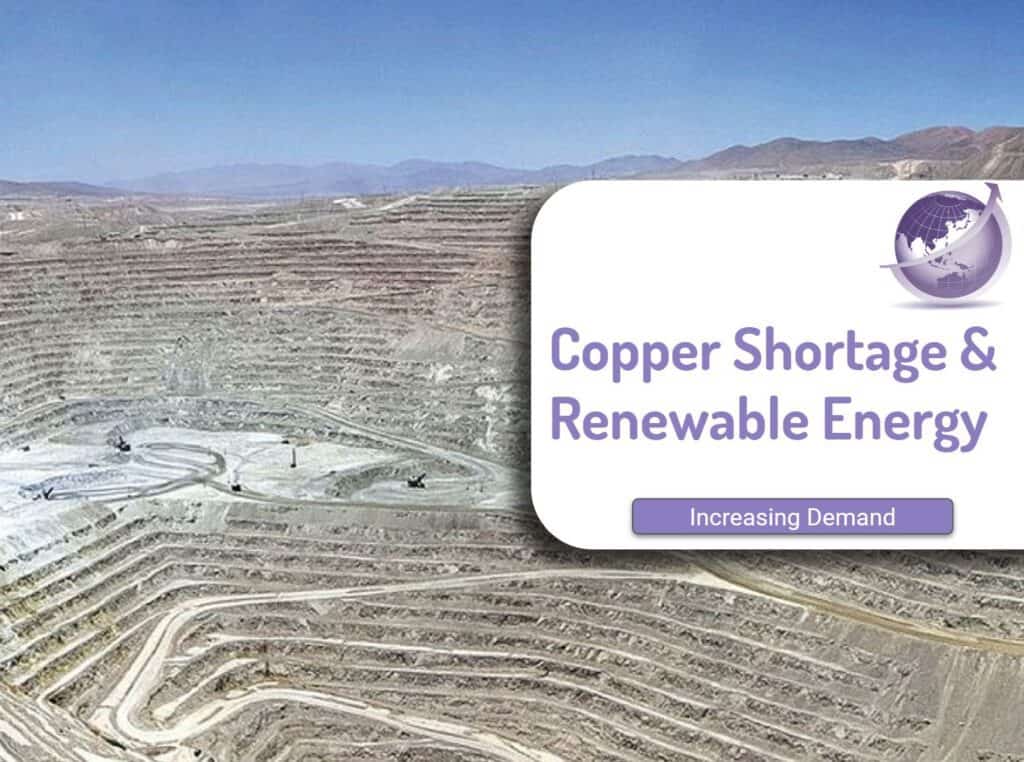Globally, copper demand with renewable energy deployment is increasing with estimates of at least 10 million tonnes more copper needed over the next decade. Wherever there is electricity, copper is there to conduct it.
As we head towards net-zero emissions, record quantities of copper will be required. Copper is critical for solar panels, wind turbines, electric vehicles and battery storage. We are headed for a supply crunch. Market analysts estimate the annual copper supply shortfall could be as high as 10 million tonnes by 2030 if no new mines are built. This means prices are on the rise, giving miners an incentive to bring new copper mines to market.
Updated July 2023
OilPrice reports that Goldman Sachs and CRU group both say new technology reduces the amount of copper in EVs. CRU predicts the average EV will use between 51-56 kg copper from this year to 2030. This is a significant decrease from their previous estimate of 65-66 kilograms. Similarly, Goldman Sachs predicts that the amount of copper in an average EV will decrease to 65 kilograms per vehicle by 2030, compared to their previous estimate of 73 kilograms in 2022.
In August 2023, the industry realised demand has destroyed by over 20m tonnes lower through to 2030 (Mining.com). Industry will use less or substitute copper entirely including in electricity transmission and distribution networks, renewable generation capacity, communication cables, industrial air conditioning units, and the transport sector.
Copper Demand Driven by Electrifying Energy and Transportation
Copper is the third-most-consumed industrial metal in the world behind iron and aluminium. The electrical industries of electrical wires, telecommunication cables, and electronics is 75% of demand. Copper is only second to silver when it comes to thermal and electrical conductivity. Mixing with other metals as alloys is the remaining 25% including common alloys such as brasses, bronzes, and nickel silvers.
Challenges to Increase Supply
- Unearthed copper deposits are in remote and difficult locations making mining expensive.
- Opposition to new mines
- New mines lower ore % and deeper
- New copper mines will likely be located in politically and ecologically sensitive areas
Copper Production
Copper production has increased from 15 million tonnes in 2000 to 25 million tonnes by 2020, and Chile accounts for a quarter of the reserves.
| Country | 2018 (Metric Tons) | 2017 |
|---|---|---|
| Chile | 5,831,600 | 5,503,500 |
| Peru | 2,436,951 | 2,445,585 |
| China | 1,561,100 | 1,706,400 |
| DR Congo | 1,239,059 | 1,094,638 |
| United States | 1,220,000 | 1,260,000 |
| Australia | 913,336 | 849,121 |
| Zambia | 861,946 | 799,329 |
| Russia | 785,300 | 762,300 |
| Mexico | 696,580 | 742,246 |
| Indonesia | 651,132 | 621,979 |
| Kazakhstan | 632,550 | 540,700 |
| Canada | 542,932 | 597,194 |
| Other 44 countries | 3,090,400 of the total 20m tonnes |
The amount of copper in an ore can vary from 0.4% to 2% although there are some as high as 12%. Porphyry copper deposits, in which the copper materials are more or less uniformly scattered throughout the rock, account for the greatest tonnage of metal in the producing areas of the world.
Industry Dominated by 12 Companies in 4 Countries


Is The Supply Shortage Real?
The Copper Alliance has a range of discussion papers.
- Global copper reserves are estimated at 830 million tonnes (US Geological Survey [USGS], 2019)
- Annual copper demand is 28 million tonnes.
- Since 1950 an average of 40 years of copper deposits and over 200 years of resources have been available. Reserves make up discovered and potentially profitable deposits as well as undiscovered deposits predicted based on preliminary geological surveys.
- Copper resources total 5,000 million tonnes (USGS, 2014 & 2017).
- Recycled copper provides 35% of demand, significantly reducing the need for mined copper.
The data is clear. There is enough copper to meet current and future demand. Car components copper will rise to 6 million tonnes per annum by 2040,. This is an increase of 143% from 2020 levels (IDTechEx predictions). With annual demand about 28m tonnes, there appears to be no constraint.


Further Reading
- Copper demand destruction. https://www.mining.com/over-20m-tonnes-of-copper-demand-could-be-destroyed-through-2030/
- Innovation Networks https://www.innovationnewsnetwork.com/green-revolution-use-of-copper-in-evs/22503/
- Copper Alloance https://copperalliance.org/resource_topic/copper-demand/
- https://worldpopulationreview.com/country-rankings/copper-production-by-country
- https://oilprice.com/Metals/Commodities/New-EV-Innovations-Put-A-Dent-In-Copper-Demand.html
- Visual Capitalist https://www.visualcapitalist.com/the-looming-copper-supply-crunch/









